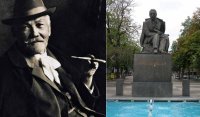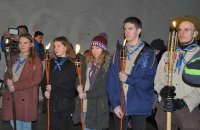 Today, Slovak nation remembers the 175th birth anniversary of one of the greatest Slovak poets – Pavol Országh Hviezdoslav.
Today, Slovak nation remembers the 175th birth anniversary of one of the greatest Slovak poets – Pavol Országh Hviezdoslav.
Pavol Országh (Hviezdoslav being his pseudonym) was born on February 2, 1849 in Vyšný Kubín, Orava region, into a poor aristocratic family. After finishing primary school, he continued to study in Leštiny, where he was taught by Adolf Medzihradský. Medzihradský, besides teaching Slovak language, created the code of conduct for pupils in Slovak language. This code is preserved and can be viewed in Museum in Kežmarok. Just to be clear, at the time, Slovakia was officialy a part of Austria-Hungary, therefore all documents were written in Hungarian language.
Medzihradský was aware of his talented pupil and recommended him to continue in his studies and attend university. Even though the first Országh's poems were written in Hungarian, he was always very fond of German literature of Goethe and Schiller. Later, he began to connect with his roots again and started to write in Slovak language. In 1868, his first poems were published under (yet another) pseudonym – Jozef Zbranský.
 In 1875, after studying at Academy of Law in Prešov and successfully passing exams in Budapest, Országh began his carreer as a lawyer. He worked in this profession for over two decades and even founded his own law office in Námestovo. However, he was still writing poems, already using the pseudonym Hviezdoslav, which literally means “celebrating the stars”. Why did Országh choose this name? We can only assume he was inspired by his lifelong adoration of stars. It was in Námestovo, where he created his best works, lyrical poems and epic works. In 1899, he had moved to Dolný Kubín and raised two adoptive children together with his wife. At the time, he wrote some of his best known literary works Hájnikova žena, Ežo Vlkolinský and Gábor Vlkolinský, where he describes the lives of landlords and farmers, and depicts the image of Slovak village. Országh also wrote a number of plays, such as Pomsta, Otčim, Oblaky and tragic play Herodes a Herodias.
In 1875, after studying at Academy of Law in Prešov and successfully passing exams in Budapest, Országh began his carreer as a lawyer. He worked in this profession for over two decades and even founded his own law office in Námestovo. However, he was still writing poems, already using the pseudonym Hviezdoslav, which literally means “celebrating the stars”. Why did Országh choose this name? We can only assume he was inspired by his lifelong adoration of stars. It was in Námestovo, where he created his best works, lyrical poems and epic works. In 1899, he had moved to Dolný Kubín and raised two adoptive children together with his wife. At the time, he wrote some of his best known literary works Hájnikova žena, Ežo Vlkolinský and Gábor Vlkolinský, where he describes the lives of landlords and farmers, and depicts the image of Slovak village. Országh also wrote a number of plays, such as Pomsta, Otčim, Oblaky and tragic play Herodes a Herodias.
After WWI, he wrote a series of lyrical poems called Krvavé sonety. He was politically and socially active figure, promoting the idea of unification of the two brotherly nations – Czechs and Slovaks. About six months later, on October 28, a new country was formed – Czechoslovakia.
Since Hviezdoslav is one of the prominent characters of Slovak literature and culture at the turn of the 19th and 20th centuries, the nation honours his memory until today. Square in Bratislava Old Town with a monument, always decorated with flowers, is named after the author. Besides that, a lantern parade takes place every year on his birth annivesary. This year is no exception, so make sure not to miss this spectacular event!
Author: Bc. Alexandra Koreňová
Translation: Simona Nagyová


